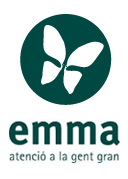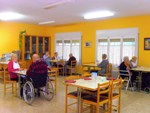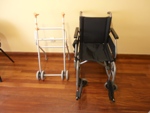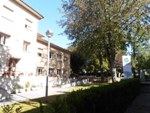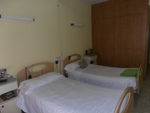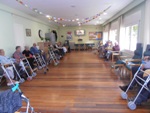The Emma Foundation promotes and manages resources aimed at the elderly. It offers residential, day center and social canteen services to elderly people with some type of dependency. It currently has 59 residential places, of which 24 are collaborators and 16 day center places, all of them with a collaboration contract with the Generalitat.
To deal with the diversity of services, we have a wide range of professionals from different disciplines: nursing, social work, physiotherapy, animation, occupational therapy, psychology and geroculteurs; on the other hand, they have staff from the general services: administrative, kitchen, cleaning, laundry...; we also have other professionals for complementary services: podiatry, hairdressing, maintenance...; finally we have the added value of volunteering.

It is a service that provides balanced and adapted meals for the elderly. The preparation corresponds to the kitchen service of the residence.
Targets:
Ensure an adequate, balanced diet adapted to the needs of the person.
Recipients:
People with social needs and who need help to have adequate nutrition. People who live alone and who choose to eat at least one balanced meal with company. People who come out of a post-operative and are unable to cook for themselves. Other situations
Staff:
The dining service is provided by the residence's own staff. It consists of the kitchen service, in charge of preparing the meals; the gerocultores, in charge of serving the food and helping those people most assisted; the health and hygiene manager, in charge of supervising the meals; the social worker, in charge of making the initial reception and processing the contract; administrative staff, in charge of managing the necessary documentation.
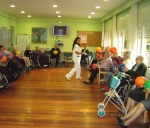
What is the day center?
It is a day care service and assistance in the activities of daily life for elderly people with dependencies.
In the specific case of Sant Joan de les Abadesses, it is provided as an integrated service in the spaces of the Residence, therefore it means enjoying the advantages offered by a residential service at the same time that the ties with the family or the home are fully maintained .
Targets:
Facilitate a compensatory environment at home, suitable and adapted to the needs of assistance.
Favor the recovery and maintenance of the maximum degree of personal and social autonomy.
Maintain the acceptance of the person with disabilities in their socio-familial environment.
Provide support to families who care for the elderly.
Features:
- Reception and coexistence.
- maintenance
- Personal hygiene assistance.
- Personal attention to the activities of daily life.
- Functional and social readaptation.
- Sociocultural revitalization.
- Family support
- Guarantee monitoring and prevention of health disorders.
Optional features:
- Hair salon
- Laundry room
- podiatry
- Transportation
- Attention on weekends and holidays, if necessary
Direct recipients:
Elderly people over 65 who need organization, supervision and assistance in the development of activities of daily life, and who see their care completed in their social and family environment.
Indirect recipients:
Family members who take care of an elderly person/s at home and it suits them to free up one or more days per week to have personal time.
Timetable:
The standard hours of the Day Center are from 9.45 to 18.00 from Monday to Friday. The user or his family will be able to choose whether they want to do one to seven days of care.
In the event that a user or his family needs a few hours of care other than those stipulated in this framework schedule, we will discuss it individually and find the most convenient solution for the user, the family and the Foundation.
Displacement:
The price of the Day Center does not include transport or travel from the user's home to the center and vice versa. Within this schedule, and from Monday to Friday, the Foundation has adapted transport. Outside these hours, the travel will have to be done by the family member.
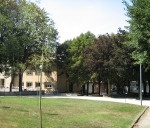
It is a service for a limited stay in the residence.
Targets:
Take care of people who need the service.
Features:
The same ones offered at the assisted living facility.
Recipients:
People who temporarily need the attention of a residential service. People coming out of a post-operative. Family members who care for an elderly person and need emotional rest.
Staff:
The same that is available for assisted living
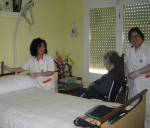 Definition:
Definition: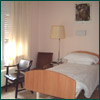
Permanent residential care service. Comprehensive assistance service for the activities of daily life for elderly people with dependencies.
Targets:
Facilitate a substitute environment for the home, suitable and adapted to the needs of assistance.
Favor the recovery or maintenance of the maximum degree of autonomy
personal and social.
Features:
- Accommodation
- maintenance
- Reception and coexistence
- Personal attention in the activities of daily life
- Autonomy habits
- Sociocultural revitalization
- Laundry and laundry service
- Personal hygiene
- Social support
- Family care aimed at promoting the relationships of the user's family and their environment
- Guarantee health care
Recipients:
Elderly people who do not have a sufficient degree of autonomy to carry out the activities of daily life, who need constant attention and supervision and who have socio-familial circumstances that require the replacement of the home.
Staff:
We have sufficient technical and direct care staff to respond to the needs of the people served.
 It is a service offered to all those people who, living at home, at a given moment need some type of technical equipment, be it wheelchairs, walkers, crutches, etc. The equipment is lent for a period of time maximum of 3 months, extendable.
It is a service offered to all those people who, living at home, at a given moment need some type of technical equipment, be it wheelchairs, walkers, crutches, etc. The equipment is lent for a period of time maximum of 3 months, extendable.
